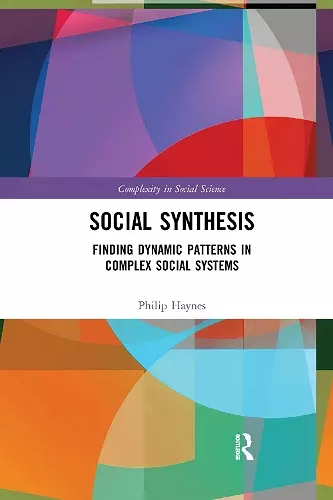Social Synthesis
Finding Dynamic Patterns in Complex Social Systems
Format:Paperback
Publisher:Taylor & Francis Ltd
Published:17th Jul '19
Currently unavailable, and unfortunately no date known when it will be back
This paperback is available in another edition too:
- Hardback£145.00(9781138208728)

How is it possible to understand society and the problems it faces? What sense can be made of the behaviour of markets and government interventions? How can citizens understand the course that their lives take and the opportunities available to them?
There has been much debate surrounding what methodology and methods are appropriate for social science research. In a larger sense, there have been differences in quantitative and qualitative approaches and some attempts to combine them. In addition, there have also been questions of the influence of competing values on all social activities versus the need to find an objective understanding. Thus, this aptly named volume strives to develop new methods through the practice of ‘social synthesis’, describing a methodology that perceives societies and economies as manifestations of highly dynamic, interactive and emergent complex systems. Furthermore, helping us to understand that an analysis of parts alone does not always lead to an informed understanding, Haynes presents to the contemporary researcher an original tool called Dynamic Pattern Synthesis (DPS) – a rigorous method that informs us about how specific complex social and economic systems adapt over time.
A timely and significant monograph, Social Synthesis will appeal to advanced undergraduate and postgraduate students, research professionals and academic researchers informed by sociology, economics, politics, public policy, social policy and social psychology.
I highly recommend this book which has several case-studies of complex change over time. Complexity theory fits the social sciences well because there is both stability and instability in the social patterns. Here we find good empirical examples. The author observes patterns over time using three main methods: a complex cluster analysis, the discerning of prime implicants from among the configuration’s characteristics, and Boolean truth-table analysis. The author thus reduces and simplifies the findings. The book makes extensive use of Qualitative Comparative Analysis (QCA) while extending this ‘mixed method’ to an intertemporal range.
Wendy Olsen, Reader in Socio-Economic Research, The University of Manchester, UK
This book responds to two important currents influencing contemporary social science: critical realism and complexity science. It provides an account of a promising new analytic method, Dynamic Pattern Synthesis, and illustrates how one can use the method with examples including the analysis of health and social care. I look forward to the application of this innovative and powerful method to a wide range of policy-relevant topics.
Nigel Gilbert, Professor of Sociology, University of Surrey, UK
ISBN: 9780367371241
Dimensions: unknown
Weight: 380g
204 pages